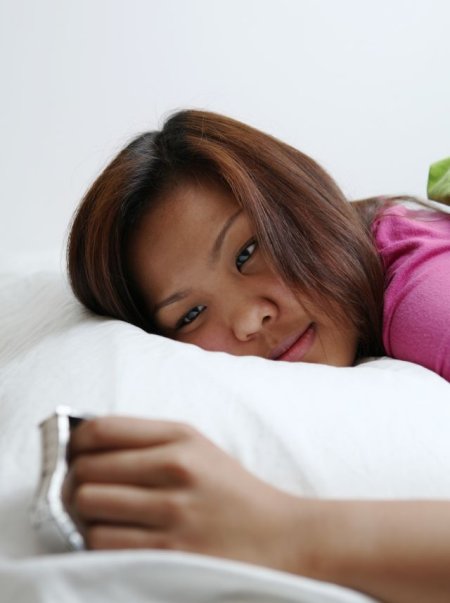It
may not actually be that late-night cappuccino that's keeping you up.
Read on for 10 surprising things that cause insomnia…that you have to
ditch now.

1. Total Silence
When it's too quiet, you're more easily awakened by a random sound, like your guy getting up to go to the bathroom or a car outside. Get a whitenoise machine or turn on a fan, both of which drown out light noise, says sleep expert Michael Breus, PhD, author of The Sleep Doctor's Diet Plan.
2. The Wrong Blinds or Curtains
If your window coverings are too short or sheer, slivers of light may sneak their way into your bedroom and thwart the production of melatonin, a hormone crucial to nodding off, says William C. Kohler, MD, medical director of the Florida Sleep Institute, in Spring Hill, Florida. Replace them with blinds, curtains, or shades that truly fit, preferably the kind labeled "blackout," which use heavier fabric or material (one to look for: nonwoven polyester).
3. Your Furry Bedtime Buddy
Even if you don't normally have pet allergies, the dander shed from animal skin and hair collects on your bedding and can irritate your nasal passageways, making you sniffle or sneeze and forcing your body awake. It doesn't help either that pets tend to move around a lot at night, says Dr. Kohler. We know you love the cuddle monster, but get him a cushy bed of his own in another room.
Related photos: 10 foods that make you sleepy
4. Your Alarm Clock
It's tempting to check what time it is when you're trying to score some shuteye. And once you do the math and realize how few hours you have until morning, it causes anxiety, making it even harder to relax and doze off. Simple fix: Turn your clock away from you so you can't see what time it is. Even more important: Stay away from digital clocks, warns Dr. Kohler. Some screens may emit light that suppresses melatonin production and leaves you tossing and turning.
5. A Gripping TV Show
If you must watch something in bed, stick to mellow shows and catch up on The Walking Dead another time. Breus says viewing something adrenaline-pumping, even sports or the news, within 30 minutes of bedtime wires your brain so it's harder to doze off.
6. The Temperature
"If you're too hot or too cold, your body will alert you by waking up," says Breus. The ideal room temp for optimum sleep is 65 to 75 degrees fahrenheit (or 18 to 23 degrees celsius), depending on your personal preference. Opt for cotton sheets and blankets-the material lets air circulate and helps maintain a comfy temperature under the covers. If your body temp tends to rise a lot when you're sleeping, Breus advises getting moisture-wicking sheets and pajamas that dry up sweat to keep you cool all night long.
Related: How much sleep do you actually need?
7. The Color of Your Walls
You may love your hot orange or electric blue walls, but hues like these aren't sleep-friendly. "Bold colors are meant to jolt and inspire you, so if you surround yourself with red, orange, or certain blue hues, you'll have a harder time winding down," says Breus. Paint your bedroom walls a subdued, muted color, like an earth tone, which naturally relaxes your system.
8. The Glow From Your Laptop or Tablet
Having a backlit screen just inches from your eyes inhibits the production of melatonin, keeping you alert, explains Breus. Shut down your laptop or e-reader at least an hour before hitting the sheets. If you can't resist knocking off a few chapters or pages before crashing, use a Kindle, which isn't backlit, or-here's an idea-an actual book or magazine (illuminated by a soft night-light), suggests Breus.
9. Your Cell
The backlit screen and digital clock aren't the only features of your smartphone that work against you. Just the anticipation that you may get a call or text can keep you on edge and unable to switch off your brain, says Dr. Kohler. We know it's hard to cut the cord, but consider turning off your smartphone just before bedtime.
10. Clutter
"Lots of physical stuff scattered around subconsciously reminds you of things that are weighing on your mind, like tasks you've put off and nagging anxieties," says Breus. That can raise your heart rate and increase stress-hormone levels, preventing you from sacking out. You don't have to be at Hoarders level to be affected-that pile of laundry, those boxes from your last shopping trip, and stacks of magazines can all prevent you from getting the sleep you need.
.jpg)
No comments:
Post a Comment